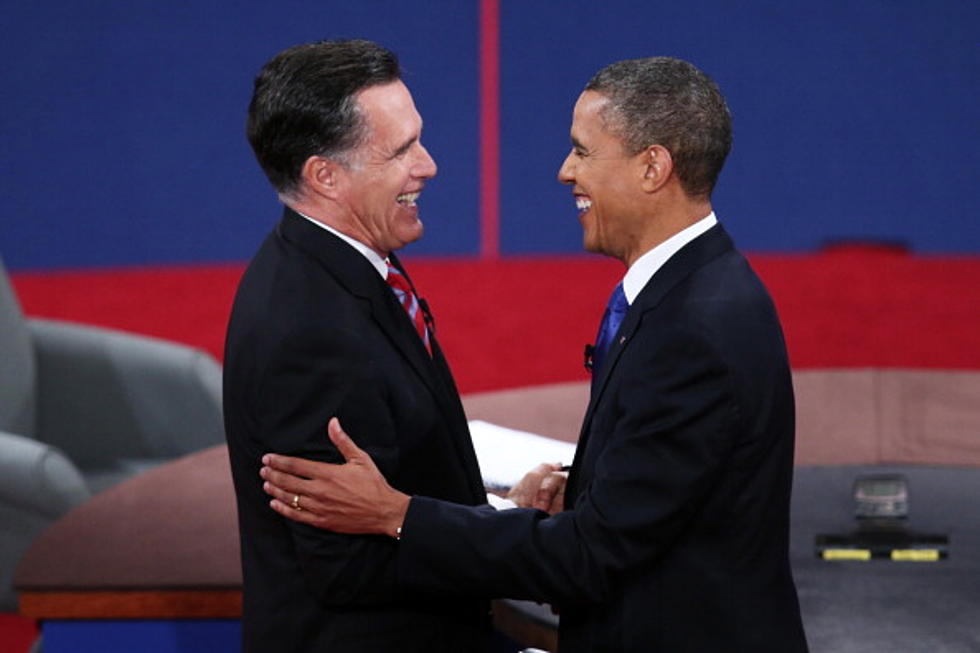![Who was the Best President of Your Lifetime? [POLL]](http://townsquare.media/site/385/files/2012/10/89277475.jpg?w=980&q=75)
Who was the Best President of Your Lifetime? [POLL]
As we spend the day honoring President’s Washington and Lincoln and saving ton of money on cars, appliances and mattresses, let us reflect on the Presidents of your lifetime and how they contributed to making our country what it is today.
In my years I have lived through ten presidents going back to John F Kennedy. It was during the JFK administration that America seemed young and hip with Jack and Jackie leading the way. Kennedy defeated Vice President and Republican candidate Richard Nixon in the 1960 U.S. presidential election. He was the youngest elected to the office, at the age of 43, the second-youngest President (after Theodore Roosevelt), and the first person born in the 20th century to serve as president. Kennedy is the only Catholic president, and is the only president to have won a Pulitzer Prize. Events during his presidency included the Bay of Pigs Invasion, the Cuban Missile Crisis, the building of the Berlin Wall, the Space Race, the African-American Civil Rights Movement, and early stages of the Vietnam War.
Kennedy was assassinated on November 22, 1963 in Dallas, Texas. Although Lee Harvey Oswald was charged with the crime, he was shot and killed by Jack Ruby two days later, before a trial could take place. The FBI and the Warren Commission officially concluded that Oswald was the lone assassin. However, the United States House Select Committee on Assassinations (HSCA) concluded that those investigations were flawed and that Kennedy was probably assassinated as the result of a conspiracy. Kennedy continues to rank highly in public opinion ratings of U.S. presidents.
In 1964 Lyndon Johnson, who had taken over when JFK died, defeated Barry Goldwater. Johnson was responsible for designing the "Great Society" legislation that included laws that upheld civil rights, public broadcasting, Medicare,Medicaid, environmental protection, aid to education, and his "War on Poverty." Johnson was renowned for his domineering personality and the "Johnson treatment," his coercion of powerful politicians in order to advance legislation. It was he who escalated the American involvement in the war in Vietnam, causing protests on campuses, He lasted until 1968 when he announced that he would not run for another term.
In 1968 Richard Nixon became President for almost 2 terms. I say almost because he resigned from the Presidency after the Watergate scandal in 1974,
Although Nixon initially escalated America's involvement in the Vietnam War, he subsequently ended US involvement in 1973. Nixon's visit to the People's Republic of China in 1972 opened diplomatic relations between the two nations, and he initiated détente and the Anti-Ballistic Missile Treaty with the Soviet Union the same year. Domestically, his administration generally embraced policies that transferred power from Washington to the states. Among other things, he initiated wars on cancer and drugs, imposed wage and price controls, enforced desegregation of Southern schools and established the Environmental Protection Agency. Though he presided over Apollo 11, he scaled back manned space exploration. He was reelected by a landslide in 1972.
Nixon’s resignation left us with Gerald Ford whom I most remember as clumsy. At least that’s how Chevy Chase portrayed him on “Saturday Night Live”
Ford was followed by Jimmy Carter, a Georgia peanut farmer who’s brother Billy was comic relief. During Carter's term as President, two new cabinet-level departments were created: the Department of Energy and the Department of Education. He established a national energy policy that included conservation, price control, and new technology. In foreign affairs, Carter pursued the Camp David Accords, the Panama Canal Treaties, the second round of Strategic Arms Limitation Talks (SALT II), and returned the Panama Canal Zone to Panama. He took office during a period of international stagflation, which persisted throughout his term. The end of his presidential tenure was marked by the 1979–1981 Iran hostage crisis, the 1979 energy crisis, the Three Mile Island nuclear accident, the Soviet invasion of Afghanistan, United States boycott of the 1980 Summer Olympics in Moscow (the only U.S. boycott in Olympic history), and the eruption of Mount St. Helens.
By 1980, Carter's popularity had eroded. He survived a primary challenge against Ted Kennedy for the Democratic Party nomination in the 1980 election, but lost the election to Republican candidate Ronald Reagan. On January 20, 1981, minutes after Carter's term in office ended, the 52 U.S. captives held at the U.S. embassy in Iran were released, ending the 444-day Iran hostage crisis.
In my opinion no one spoke better to the American people than Ronald Reagan. As president, Reagan implemented sweeping new political and economic initiatives. Hissupply-side economic policies, dubbed "Reaganomics", advocated reducing tax rates to spur economic growth, controlling the money supply to reduce inflation, deregulation of the economy, and reducing government spending. In his first term he survived an assassination attempt, took a hard line against labor unions, and ordered an invasion of Grenada. He was re-elected in a landslide in 1984, proclaiming that it was "Morning in America". His second term was primarily marked by foreign matters, such as the ending of the Cold War, the1986 bombing of Libya, and the revelation of the Iran-Contra affair. Publicly describing the Soviet Union as an "evil empire", he supported anti-communist movements worldwide and spent his first term forgoing the strategy of détente by ordering a massive military buildup in an arms race with the USSR. Reagan negotiated with Soviet General Secretary Mikhail Gorbachev, culminating in the INF Treaty and the decrease of both countries' nuclear arsenals. Reagan was followed by his vice President George Herbert Walker Bush.
In 1988, Bush launched a successful campaign to succeed Reagan as president, defeating Democratic opponent Michael Dukakis. Foreign policy drove the Bush presidency; military operations were conducted in Panama and the Persian Gulf at a time of world change; theBerlin Wall fell in 1989 and the Soviet Union dissolved two years later. Domestically, Bush reneged on a 1988 campaign promise and after a struggle with Congress, signed an increase in taxes that Congress had passed. In the wake of economic concerns, he lost the 1992 presidential election to Democrat Bill Clinton.
Clinton was elected president in 1992, defeating incumbent president George H. W. Bush. As president, Clinton presided over the longest period of peacetime economic expansion in American history. He signed into law the North American Free Trade Agreement. He implemented Don't ask, don't tell, a controversial intermediate step to full gay military integration. After a failed health care reform attempt, Republicans won control of Congress in 1994, for the first time in forty years. Two years later, the re-elected Clinton became the first member of the Democratic Party since Franklin D. Roosevelt to win a second full term as president. He successfully passed welfare reform and the State Children's Health Insurance Program, providing health coverage for millions of children. Later, he wasimpeached for perjury and obstruction of justice in a scandal involving a White House intern, but was acquitted by the U.S. Senate and served his complete term of office. The Congressional Budget Office reported a budget surplus between the years 1998 and 2000, the last three years of Clinton's presidency. Clinton left office with the highest end-of-office approval rating of any U.S. president since World War II.
When Clinton left office we were left with George W Bush. Bush was elected president in 2000 after a close and controversial election, becoming the fourth president to be elected while receiving fewer popular votes nationwide than his opponent. Bush is the second president to have been the son of a former president, the first being John Quincy Adams. He is also the brother of Jeb Bush, former Governor of Florida.
Eight months into Bush's first term as president, the September 11, 2001 terrorist attacks occurred. In response, Bush announced the War on Terror, an international military campaign which included the war in Afghanistan launched in 2001 and the war in Iraq launched in 2003. In addition to national security issues, Bush also promoted policies on the economy, health care, education, and social security reform. He signed into law broad tax cuts, the PATRIOT Act, the No Child Left Behind Act, the Partial-Birth Abortion Ban Act, and Medicare prescription drug benefits for seniors. His tenure saw national debates on immigration, Social Security, electronic surveillance, and enhanced interrogation techniques. He announced the U.S. would not implement the Kyoto Protocol on global warming, which had been signed by the previous administration but never ratified by the Senate.
Bush successfully ran for re-election against Democratic Senator John Kerry in 2004, in another relatively close election. After his re-election, Bush received increasingly heated criticism from across the political spectrum for his handling of the Iraq War, Hurricane Katrina, and numerous other controversies. As a result, the Democratic Party won control of Congress in the 2006 elections. In December 2007, the United States entered its longest post–World War II recession, prompting the Bush Administration to enact multiple economic programs intended to preserve the country's financial system. Nationally, Bush was both one of the most popular and unpopular presidents in history, having received the highest recorded presidential approval ratings in the wake of 9/11, as well as one of the lowest approval ratings during the 2008 financial crisis. Internationally, he was a highly controversial figure, with public protests occurring even during visits to close allies, such as the United Kingdom.
Bush left office in 2009, and was succeeded as president by Barack Obama, who ran on a platform of change from Bush's policies. He seems to still be running on that change asking for 4 more years.
If you ask me, the best president in my lifetime was Bill Clinton. It was during the Clinton years that I did my best financially. I had no problem with his scandalous side. It seemed like every time his popularity went up, so did the stock market and that was a good thing.
Of all the Presidents you lived through, who did you feel was the best? Please take our poll.
More From New Jersey 101.5 FM
![Romney Doesn’t Blame Christie For Loss [VIDEO]](http://townsquare.media/site/385/files/2012/04/136581917.jpg?w=980&q=75)

![Who Is New Jersey’s Favorite President? [AUDIO]](http://townsquare.media/site/241/files/2012/09/Joe-Raedle-Getty-Images2.jpg?w=980&q=75)





![Election Day In NJ And The Nation [VIDEO]](http://townsquare.media/site/385/files/2012/10/154672335.jpg?w=980&q=75)
